- Home
- Charles L. Grant
Riders in the Sky - [Millennium Quartet 04]
Riders in the Sky - [Millennium Quartet 04] Read online
* * * *
Riders in the Sky
[Millennium Quartet 04]
By Charles Grant
Scanned & Proofed By MadMaxAU
* * * *
PROLOGUE
* * * *
H
e stands at the end of a long rough jetty, nearly one hundred yards from the safety of the shore. Rhythmic explosions from twenty feet below as the cold December sea tears itself apart against the uneven boulders. His hands are in his pockets, only once in a long while slipping away to clear the cold spray that drips from his face. He wears a black denim jacket over a thick dark sweater; faded jeans, worn sneakers. With no hat for protection his hair ducks and twists in the wind.
He faces the horizon and looks at the water and sees nothing but waves rolling steadily toward him. Rising as if taking his measure, falling as if needing less distance before they can rise again, and crest, and drive him at last into the slick and jagged brown-black stone.
Clouds low and heavy.
Feathers of rain in the distance.
Every few minutes, a flare of lightning, and thunder warns.
He has been here for hours, since the winter sun first rose, and finally there’s a long deep breath, a long and slow exhalation while his eyes close and his shoulders slump and his lips move in a silent prayer he fears won’t be answered.
His name is Casey Chisholm, and he knows he’s alone.
* * * *
Far behind him, on the beach, people wait, huddled and shivering. Watching. Afraid that he won’t turn around, that he’ll forget they are there, that he will instead take that next step. Into the sea. That after all this time and after all he has told them he will be lost to them, and they’ll be lost.
Yet none move to stop him, and none move to speak to him, and none move to help him because there is nothing they can do. They can only stand there. Waiting. And watching. While the cold stiffens their limbs and discolors their faces and takes their breath and turns it into ghosts the wind blows back into their dark and fearful eyes.
Every few minutes someone will look at someone else, a raised eyebrow, a pulled-in lip, a tilt of a head, a confused shrug. With nothing to say to the man on the jetty, they have nothing to say to each other as well. Not now. Not anymore. It’s all been said and it’s all been done, and there’s no sense in doing anything else.
Just wait.
Ignore the bloodstains, ignore the cuts and bruises, pay no attention to the rough bandages and heavy cast and deeply aching muscles and sharp aching bones and the sure and certain knowledge that what they’ve been through so far can’t possibly shine a light on what they know is to come.
A tall man, lank and bowed, turns to stare at the trees that line the miles of sand that face the ocean. Nothing moves there but the branches, needled or bare. Nothing moves but clumps of violently trembling sawgrass that tops the few dunes he can see from where he stands. Nothing moves, and he turns back, expecting nothing more, a quick smile and a soft grunt when the woman beside him slips her arm around his waist.
Two children, young girls, flank a woman who wears a veil over her face, only her eyes exposed. The three hold hands and dare the wind to knock them down.
A young man and a young woman stand close without touching.
There are others. Not many.
And apart from them all is a woman who holds the neck of her thin coat closed at her throat. A scarf over her hair flutters as if trying to break loose and fly. Of them all she is the only one whose eyes are red and puffed from weeping. Yet her back is straight and her chin is up, and alone among all the others she has no trouble with a smile.
Alone among all the others, she seems to know, and she is ready.
* * * *
His name is Casey Chisholm.
* * * *
And despite the people who wait and watch and whisper prayers of their own, despite the town that lies beyond the trees, despite his years of dreams, despite the nightmares that once had been true ... His name is Casey Chisholm.
* * * *
And he is alone.
* * * *
PART 1
* * * *
1
1
A
lmost autumn; just past noon.
A light warm wind that nudges damp leaves along gutters and bats them fitfully across lawns; clouds merge in a vast blanket drawn over the horizon, drawn over the sky, smothering the light to a dark dusky haze; porch lights and streetlamps, headlamps and traffic lights; neon in store windows, too bright for the hour, too brittle for comfort.
Grey ghost pedestrians, scowling at each other, scowling at the weather, wishing the storm would hurry up and break, get it over with and get gone; in offices and shops no one speaks, hardly working, watching the windows, waiting for the storm; in schools children twitch and shift, cats’ tails, while teachers do their best to hold their attention while watching the windows, checking the wind, waiting for the storm.
* * * *
2
In a field to the south, a small carnival breaking down, preparing for the next day when it will head south for the winter.
Where it will unpack and die.
The owner has had enough. Throughout the season his games were always crowded, his rides and attractions always filled, but it was the faces that had finally made up his mind—desperate adults and hungry young ones, weary of the plagues, of the famines, of the deaths that had besieged them over the past three years, demanding happiness now, and a few moments of joy. But when they left the grounds their faces were weary, sullen; it was just too damn hard to be happy these days because when they’d get home there would always be reminders—of the plagues, of the famines, of all the damn death.
A few lights high on a half-dozen guy wire-propped poles along the edge of the midway, and a woman named Claire Sultan who walks through the shadows, one hand in her hip pocket, smelling the distant fading summer as the wind touches her cheeks and whispers through her hair. She is the daughter of the man who owns this portable, and too fragile, link to an earlier time, a time when she was young and knew how to laugh at a clown and sigh at a trained bear and shake her head without moving it at the young men who tried to impress their young women by throwing softballs into peach baskets and firing rifles at paper targets and holding their hands too tightly while the Octopus soared and twisted.
It’s almost over now, and she has no idea what she’ll do once they reach Florida and the equipment is sold and the carnies scatter and she’s left with her father, who can’t stop staring out their trailer window, wondering what had happened.
The crew has worked hard. The Ferris wheel is already down, the small tents already packed away on the trucks, the fences and gates and food stands and poles and flags and cheap gifts and cheap food long gone.
Only the carousel is left.
She takes her time getting to it, because once she does, it’s definitely all over. She’ll walk round it and pet the animals and sit in one of the benches and run her hands along a bronze pole or two, then give Marco the signal to make it all vanish. Her job. Her ride. Her life.
Her nostrils twitch, she smells rain, and she can’t put it off any longer. With one hand in that pocket, the other running down the back of her short dark red hair, she blinks away all memory and makes the carousel the only thing she sees in the haze.
Once this is gone, she thinks, I’m going to have to learn how to make a living. That frightens her. Terrifies her. No romantic, yet she still lives for the carnival; for all its scams and tricks and cons and temptations, it’s all she’s known for twenty-seven years, and all she’s ever wanted to kno
w.
Marco has asked her to marry him, says he has enough saved up to keep them until he can find another job. Forever if necessary, he had told her with a shy smile under those summer-blond curls that seldom stay where they’re brushed; I’m not all that smart, but I know how to save money. I’ll be good to you, Claire, I swear to you, I’ll be good.
He’s ten years older, has worked for the Sultans for twelve years, off and on, and she thinks she actually loves him, but right now she isn’t sure. He’s strong, he’s kind, but he doesn’t love the life the way she does.
He doesn’t love the life she’s about to lose.
Don’t be afraid, he told her; don’t be afraid, I’ll take care of you. Really. I’m not as dumb as I look.
Maybe not.
But he doesn’t understand.
* * * *
3
The carousel’s ridged circus tent top has one light at the apex, a large and bright tulip-shaped green bulb that catches bits and sharp hints of itself in the flakes of gold paint years of weather haven’t yet peeled away. Beneath, her pets wait for her good-byes—a pair of strutting llamas, a pair of strolling giraffes, a lion in full roar, an ostrich in full gallop; two old-fashioned sleighs for those who can’t take the up-and-down; red horses, black horses, white horses, gold and bronze and speckled horses with hand-carved manes and hand-painted hooves and bared teeth she touches up with a small brush every year.
She is alone now because the others know and keep their distance.
They’re also on the lookout for trouble, for the gang of young men and women, almost two dozen strong, who had swept through the grounds late the night before, swaggering through the crowds, taunting the acts, daring roustabouts to fight, scattering with high-pitched laughter when the police finally arrived, leaving behind broken whiskey and beer bottles and a few cuts and bruises.
They left the carousel alone.
“Well,” Claire says, grabbing a pole, swinging up to face a one-eyed llama. “Well.”
Twenty-seven years old, she could pass for thirty-five. Older. Hard lines from a hard life she wouldn’t have had any other way. A life that had driven her mother into a distant memory when Claire was only five. A mother Claire had stopped wondering about a long time ago. Gone is gone; what’s left is the life.
With a twitch of a grin she slaps the llama lightly on its frozen rump and moves on to the ostrich, running a palm along its wood-feathered flank and across one raised leg.
“Well.”
The smell of oil and sweat and thousands of children’s rumps and grown-ups’ feet and sneakers and babies who cried all the way around in the circle that a philosopher might say never ends; but she knows that riding the horse, or the lion, or that tiger on the other side never takes you in a circle. It’s forward; always forward, through a kaleidoscope dream that lasts for as long as the number of tickets in your hand.
“Oh...hell,” she mutters at a sudden tear on her cheek. A swipe more annoyed than angry takes it away, and she dries her hand on her hip.
What she wants to do, what she wants desperately to do, is open the hidden door in the fat center column covered with mirrors and painted faces, slip inside the control room, and turn the switches on.
Lights. Music. Up and down.
One more time.
One last time.
Let the music reach the town and let the children hear and dream, while she rides her favorite lion. Forward. Into a dream.
But she can’t, and she knows she can’t, because it would break her too-old young heart.
Instead she leans up on her toes and plants a silly kiss on the underside of a giraffe’s stiff lifted chin; she stretches out on a sleigh and stares at the underside of the canopy, at the struts and bars that lift the animals up and down, searching for the clown faces she’s sketched up there, one for every season, her notches for surviving another year.
She can’t see them; not yet the middle of the afternoon, and it’s already too dark up there.
A sigh, a quick laugh at herself, and she swings to her feet and yelps, “Jesus!” when she sees the man watching her.
“Sorry.” He steps into the green light. “Didn’t mean to startle you.”
He’s not very tall, wearing old western boots scuffed to hell and back, jeans so old that what blue is left looks like patches, a long-sleeve black shirt under an open vest decorated with what she thinks are Indian designs of some kind. He has a low-crown black western hat that hangs down his back on a beaded string. When he steps closer she sees his hair, parted in the center and gathered into a ponytail reaching just above the middle of his spine, a little grey in brown-red, gleaming as if it has just been washed and brushed. His face is thin, a sharp nose, chin and cheeks hidden by white-and-brown-red stubble, thicker on the chin where it almost makes a beard.
Despite the light, she can’t really see the color of his eyes.
“We’re closed,” she tells him with an apologetic shrug, dusting a nervous hand over her jeans. “Sorry, sir, but you’ll have to leave.”
“Oh, I intend to,” he answers. A smile, wide enough to show white teeth, quick enough to make her wonder if he really smiled at all. His voice is soft and thin, some kind of accent she can’t quite place. Maybe Kansas, maybe Texas. He nods at the carousel. “This is special, you know.”
“I know.”
“Don’t see many like it anymore.” Another step, the breeze takes on a chill, and she can hear rumbling in the dark distance. The clouds bringing rain that will make leaving tomorrow a royal pain in the butt. He reaches out to touch a pole. Caresses it. The now-you-see-it smile again. “Been a long time since I rode on these things.”
“Mister, look, really, I don’t want to be rude or anything, but I’ve got a lot of work to do. I can’t—”
His hand drops, tucks into a front pocket. “Sorry again. I guess I shouldn’t bother you.” Soft voice. Thin voice. Gentle voice. He squints as if in thought. “Hear you’re closing up shop. For good, I mean.”
She nods ruefully. “Soon as we get to Florida, it’s all gone.”
“Kind of sad.”
“Not ‘kind of at all,” she says, suddenly angry. “It damn well is sad.”
Sawdust slips across the ground ahead of the wind; pieces of straw; scraps of paper.
He glances at the sky as faint lightning flares through the belly of the clouds. “Then don’t end it,” he tells her, scuffing a heel along the ground. “Keep on.”
“Yeah, right.” She jabs a finger at the dark. “Those damn people out there, they wouldn’t know a good time if it bit them in the ass.”
“Been rough the past few years, you oughta know that.”
“Yeah, so? So they gotta curl up and die?” She moves to the edge of the platform and leans against a pole. “Have you seen the kids, mister? My God, they’re older than their parents.” She forces a shiver. “You should hear them laugh. Like they’ve never done it before in their lives.”
He nods, rubs one cheek with a finger.
She shakes her head, the disgust she’s felt all season moving into her throat. She doesn’t understand why, and why now, but she can’t stop it.
“The last month we’ve been in Michigan, Illinois, saving Ohio for last because it was always the best. I can’t tell you why, but it has been, for as long as I can remember.” A halfhearted kick at the air. “It’s been like traveling through a desert, man, like traveling through a desert.”
He watches her; patient.
“And last night those ... those ...” She can’t find a word that wasn’t born in the gutter. A deep breath. An apologetic smile, a lift of her eyebrows. “Sorry.” A hand across her brow, and it pushes up through her hair. “We had some trouble last night.”
“So I hear.” He scratches under his chin, closes an eye as he looks at the sky. “You take care of them?”
“No. Cops came, scared them off.”
“Ruined that farewell performance.”
She nods,
anger wrapping an iron band around her chest once again. “It would have been nice, it really would have been nice to go home on a high.” Another deep breath doesn’t calm her. “Bastards. Cops ... man, are they useless. they said they were just letting off steam, being Saturday night and all. We shouldn’t take it personally.” Her eyes roll. “Jesus. Not take it personally.”
The smile. “Spare the rod.”
She looks at him, wondering. Blinks and says, “Not that I expect any better. I mean, we do all the work, and we’re always the bad guys, you know what I mean?” A rueful grin. “Traveling guys like us, carnivals and whatever, we don’t have the best reputations in the world.”

![[Oxrun Station] The Orchard Read online](http://i1.bookreadfree.com/i/03/17/oxrun_station_the_orchard_preview.jpg) [Oxrun Station] The Orchard
[Oxrun Station] The Orchard![Riders in the Sky - [Millennium Quartet 04] Read online](http://i1.bookreadfree.com/i/03/20/riders_in_the_sky_-_millennium_quartet_04_preview.jpg) Riders in the Sky - [Millennium Quartet 04]
Riders in the Sky - [Millennium Quartet 04]![Chariot - [Millennium Quartet 03] Read online](http://i1.bookreadfree.com/i/03/19/chariot_-_millennium_quartet_03_preview.jpg) Chariot - [Millennium Quartet 03]
Chariot - [Millennium Quartet 03]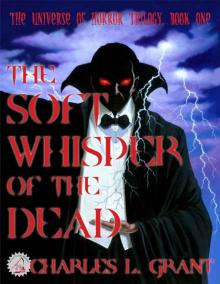 The Universe of Horror Volume 1: The Soft Whisper of the Dead (Neccon Classic Horror)
The Universe of Horror Volume 1: The Soft Whisper of the Dead (Neccon Classic Horror)![[Oxrun Station] Dialing The Wind Read online](http://i1.bookreadfree.com/i/03/19/oxrun_station_dialing_the_wind_preview.jpg) [Oxrun Station] Dialing The Wind
[Oxrun Station] Dialing The Wind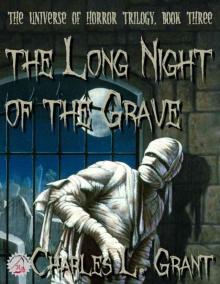 The Universe of Horror Volume 3: The Long Night of the Grave (Neccon Classic Horror)
The Universe of Horror Volume 3: The Long Night of the Grave (Neccon Classic Horror)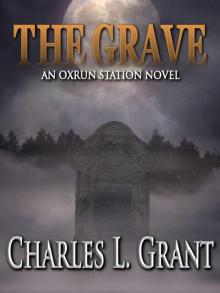 The Grave - An Oxrun Station Novel (Oxrun Station Novels)
The Grave - An Oxrun Station Novel (Oxrun Station Novels)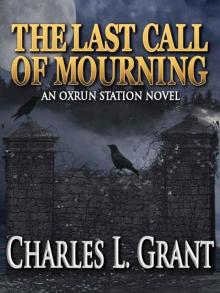 The Last Call of Mourning - An Oxrun Station Novel (Oxrun Station Novels)
The Last Call of Mourning - An Oxrun Station Novel (Oxrun Station Novels)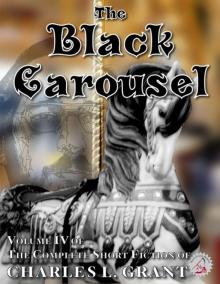 The Complete Short Fiction of Charles L. Grant, Volume IV: The Black Carousel
The Complete Short Fiction of Charles L. Grant, Volume IV: The Black Carousel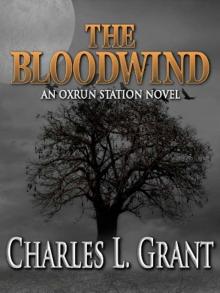 The Bloodwind - An Oxrun Station Novel (Oxrun Station Novels)
The Bloodwind - An Oxrun Station Novel (Oxrun Station Novels)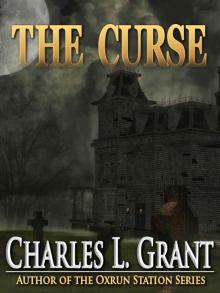 The Curse
The Curse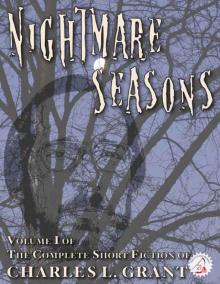 The Complete Short Fiction of Charles L. Grant Volume 1: Nightmare Seasons (Necon Classic Horror)
The Complete Short Fiction of Charles L. Grant Volume 1: Nightmare Seasons (Necon Classic Horror)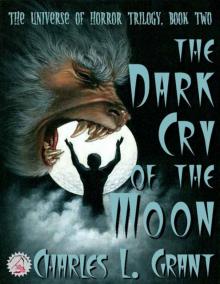 The Universe of Horror Volume 2: The Dark Cry of the Moon (Neccon Classic Horror)
The Universe of Horror Volume 2: The Dark Cry of the Moon (Neccon Classic Horror)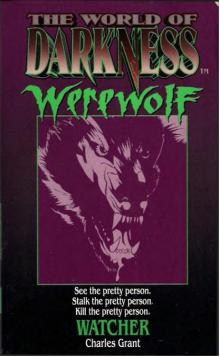 Watcher: Based on the Apocalypse (World of Darkness : Werewolf)
Watcher: Based on the Apocalypse (World of Darkness : Werewolf)![[Oxrun Station] The Bloodwind Read online](http://i1.bookreadfree.com/i/03/25/oxrun_station_the_bloodwind_preview.jpg) [Oxrun Station] The Bloodwind
[Oxrun Station] The Bloodwind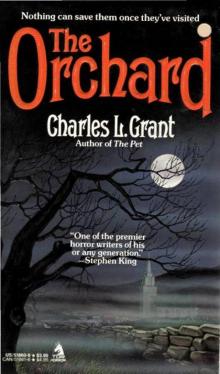 The Orchard
The Orchard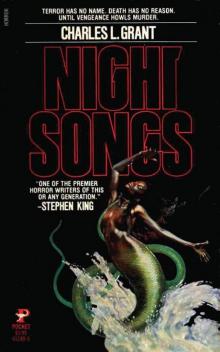 Night Songs
Night Songs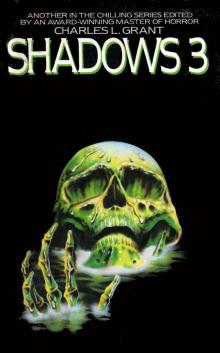 Shadows 3
Shadows 3![Symphony - [Millennium Quartet 01] Read online](http://i1.bookreadfree.com/i1/04/02/symphony_-_millennium_quartet_01_preview.jpg) Symphony - [Millennium Quartet 01]
Symphony - [Millennium Quartet 01] The Hour of the Oxrun Dead (Necon Classic Horror)
The Hour of the Oxrun Dead (Necon Classic Horror)![In the Mood - [Millennium Quartet 02] Read online](http://i1.bookreadfree.com/i1/03/31/in_the_mood_-_millennium_quartet_02_preview.jpg) In the Mood - [Millennium Quartet 02]
In the Mood - [Millennium Quartet 02]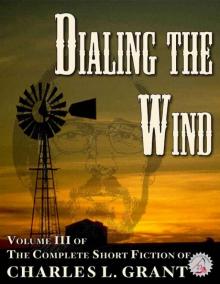 The Complete Short Fiction of Charles L. Grant Volume 3: Dialing the Wind (Neccon Classic Horror)
The Complete Short Fiction of Charles L. Grant Volume 3: Dialing the Wind (Neccon Classic Horror)![[Oxrun Station] The Last Call of Mourning Read online](http://i1.bookreadfree.com/i2/04/05/oxrun_station_the_last_call_of_mourning_preview.jpg) [Oxrun Station] The Last Call of Mourning
[Oxrun Station] The Last Call of Mourning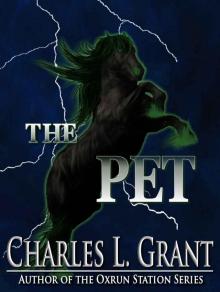 The Pet
The Pet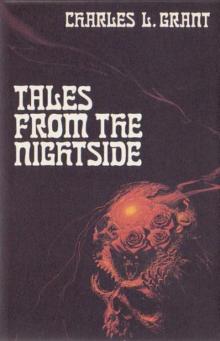 Tales from the Nightside
Tales from the Nightside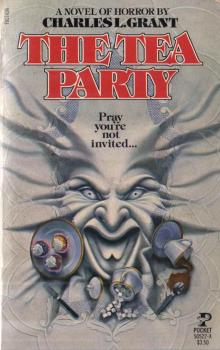 The Tea Party - A Novel of Horror
The Tea Party - A Novel of Horror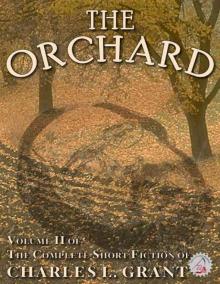 The Complete Short Fiction of Charles L. Grant Volume 2: The Orchard (Necon Classic Horror)
The Complete Short Fiction of Charles L. Grant Volume 2: The Orchard (Necon Classic Horror) Whirlwind
Whirlwind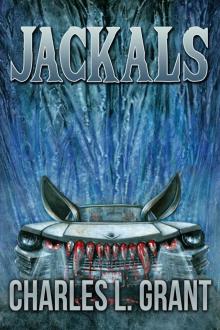 Jackals
Jackals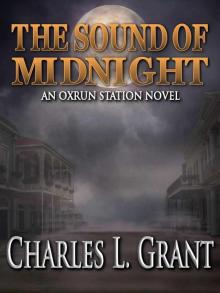 The Sound of Midnight - An Oxrun Station Novel
The Sound of Midnight - An Oxrun Station Novel